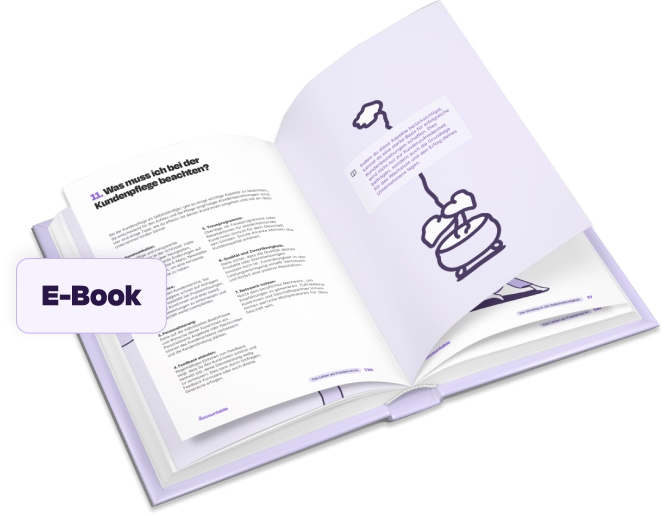As a self-employed person, you cannot avoid the topic of taxes. Unlike employees, who have income tax and other taxes deducted from their wages, freelancers or Gewerbetreibende (tradespeople) have to take care of their taxes themselves. But this should not discourage you from starting your own business or working as a freelancer! Once you have gained an overview, the subject of taxes is not as obscure as you might expect. Especially the regulations regarding VAT (value added tax) are actually not that complicated.
Unlike income tax, which you pay as a freelancer or Gewerbetreibender on your income, the state levies VAT on your services or goods.
VAT is called Umsatzsteuer or Mehrwertsteuer in Germany. It it the counterpart of the tax that you pay on all products you purchase. The only difference between them is the paying party. While in the case of VAT, it's companies who pay it, the Mehrwertsteuer is paid by the end consumer.
Depending on the service or good, there are two different tax rates:
Depending on the service or good offered, you must add 19% or 7% to the net value of your service or product sold and pay it to the Finanzamt (tax office). This means that VAT is an indirect tax, which you do not have to pay, but which you receive from your customers to pass on to the state.
💡 By the way, the VAT regulations apply to part-time self-employed persons in the same way as to full-time self-employed persons.
However, as a freelancer or Gewerbetreibender you not only collect VAT, you also pay VAT on your business purchases. You can deduct this amount from the VAT you pay as a self-employed person. The amount you have to finally pay to the Finanzamt is calculated by deducting the VAT paid for your business expenses from the VAT received for your services.
In some cases, you collect less VAT than you have paid VAT yourself for your business expenses. Then a so-called Vorsteuerüberhang (VAT surplus) arises, which you get refunded by the Finanzamt. You simply indicate this on your VAT return, which you submit to the Finanzamt on a monthly or quarterly basis, and you usually receive the payments back within one to three weeks.
💡With the tax solution from Accountable, you can create and submit your VAT return without any prior tax knowledge. You will also see immediately if you have to pay VAT or get money back!
Pay attention to a few rules and the whole VAT process will work out stressfree for you.
When you write your invoices, you must not forget the information that is mandatory. For incoming invoices, you should carefully check whether everything is correctly stated, so that there are no problems with stating received VAT.
💡The easiest way to write invoices is with the Accountable app and web version. Our templates are always 100% correct and you can customize them according to your style and taste.
Especially when you invoice clients outside of Germany, determining the correct tax rate is not always easy. In addition, for services that go abroad, it is not only important to provide your tax ID. You also need a so-called VAT ID. It's issued by the Federal Ministry of Finance and is needed to identify a company in the EU. It is necessary to be able to precisely assign the tax liability of the companies or persons involved.
As soon as you offer your services in other European countries and are liable for VAT, you must apply for such an VAT ID number. Services that you supply to companies outside Europe are exempt from taxes.
💡Here is what you need to know about the VAT ID and the other tax numbers.
The Finanzamt expects regular documentation and payments of VAT. This is done with the VAT return (in german Umsatzsteuer-Voranmeldung). You can submit it via the official ELSTER platform. But the easiest way to do this is with a tax solution like Accountable. You either have to submit it monthly or every three month. The deadline is always the 10th of the month. You should always meet this deadline, otherwise you may be subject to late filing penalties.
After you submitted your VAT return, you also have to pay the VAT to the Finanzamt (or you get money back). You are responsible for the payment which is also due on the 10th of the month.
💡 If you are registered as a Kleinunternehmer, the VAT regulations are much simpler. If you are self-employed but don't exceed a certain profit threshold, you don't have to deal with VAT at all. In the following section we explain the Kleinunternehmer rule in more detail.
In general, all self-employed persons and every business in Germany must pay VAT - regardless of whether you are a freelance artist or a craft business. However, there is one exception: Kleinunternehmer (small businesses) are exempt from paying and collecting VAT.
The Kleinunternehmer limit is clearly regulated: Your annual turnover must not exceed 25,000 euros. In the next year, the planned turnover may not exceed 100,000 euros. As a founder, the turnover limit for the first business year must not exceed 25,000 euros. If you decide to become self-employed during the course of the year, your revenues will be projected for the entire year.
However, even if your income does not exceed these limits, you are by no means forced to make use of the Kleinunternehmer regulation. Besides many advantages, this decision also has some disadvantages.
💡What you should know: If you decide to register as a Kleinunternehmer according to §19 paragraph 1, this legal regulation applies for 5 years. Unless you exceed the income limit and automatically fall out of this regulation.
If you are just starting out and don't yet earn that much, the Kleinunternehmer regulation is a great advantage. Because your bookkeeping obligations are reduced and you can sell your services or goods to your clients at a lower price, which gives you a competitive advantage over large companies who have to add VAT to the final price.
On the other hand however, don't forget that you cannot reclaim VAT for business expenses either. As a result, business investments are sometimes much higher than for those, who don't make use of the Kleinunternehmer regulation. There is also the prejudice that Kleinunternehmer are not serious about being self-employed, which can give you an unprofessional image as a small business owner.
The VAT ID, which companies with foreign business operations absolutely need, is generally not necessary for Kleinunternehmer, as they do not pay any VAT. The only exception are self-employed persons who offer their goods on platforms. Since 01.07.2021, Kleinunternehmer who sell their products on Amazon, Etsy or Co must apply for a VAT ID and register with it on the platforms.
Watch out when having clients abroad! Note that buying and selling abroad can be quite complicated for Kleinunternehmer. If you are not careful, you may have to pay VAT to the Finanzamt that you did not receive from your clients. Learn about it here.
20 Kapitel knallhart recherchiert und vom Steuerprofi geprüft
Kostenlos herunterladen

Author - Sophia Merzbach
Sophia has been a key member of the Accountable team for many years, bringing a unique blend of journalistic precision and in-depth tax expertise to her work.
Who is Sophia ?Thank you for your feedback!
Useful
How much income tax is deducted from your income is largely determined by your tax class. There are ...
Read moreWorking as a self-employed professional has many advantages: You are your own boss and you can choos...
Read moreWorking with international clients can be tricky, depending on where exactly they’re located, whet...
Read moreAccountable ist sehr einfach zu bedienen. Und macht Steuern für Solo selbständige so einfach wie nie zu vor.
Anonym
Accountble ist einfach zu bedienen und übersichtlich.
Regine Müller-Waldeck
Die Kommunikation war sehr gut und sehr genau. Im Fall wie es bei mir war hätte ich mich gefreut ein Telefonat zu führen. Es wäre auch sehr gut eine Telefonnummer zu haben wo man sich an einen Mitarbeiter wenden hätte können. Heute bekommt man sehr viele Spam Nachrichten die täuschend echt sind.
Peter Goerke
Ich bin schwer begeistert, die Platform ist wirklich ausgereift, man ist kein Versuchskaninchen, außerdem ist es trotz Digitalisierung sehr persönlich und direkt, ich fühle mich richtig aufgehoben und die Kundenservice ist unübertroffen, einziges Manko ist das ext. Steuerbüro Consentes, auf Fragen wird nicht oder spät geantwortet, verlangen jedoch einen horrenden Betrag nur um mit dem Finanzamt zu sprechen, da greife ich lieber selber zum Hörer, das soll das Erlebnis mit Accountable, aber in keinem Fall schmälern, endlich eine All-in-One Lösung, die hält was Sie verspricht!
Anonym
Bis jetzt alles Top, guter Sapport.
John Niehaus
sehr guter technischer support zum Abo. Steuerfragen hatte ich noch nicht.
Sergej Rothermel
Sehr guter Kundenservice, individuell und verständlich. Ausgezeichnete Fachkompetenz! Besser als jeder Steuerberater hier bei uns. Absolut empfehlenswert!
Birgit Kleinert
Zuerst einmal möchte ich mich ganz herzlich bedanken, für die intensive und professionelle Betreuung meiner Steuerangelegenheit. Bei wirklich all meinen Fragen und es waren nicht wenige, hat Daniela mir geholfen. Besonders hervorheben möchte ich, das man hier auf eine Frage die man bezüglich der Steuer stellt, nicht lange auf seine Antwort warten muss. Accountable, ein "Rund-um-Sorglos-Paket"! Vielen Dank Peter Albuscheit
Peter Albuscheit
Alles super, sehr freundlich und hat mir bei der Lösung meines Problems geholfen.
Alexander Adam
Sehr schnelle und kompetente Rückmeldung.
Frank Meier